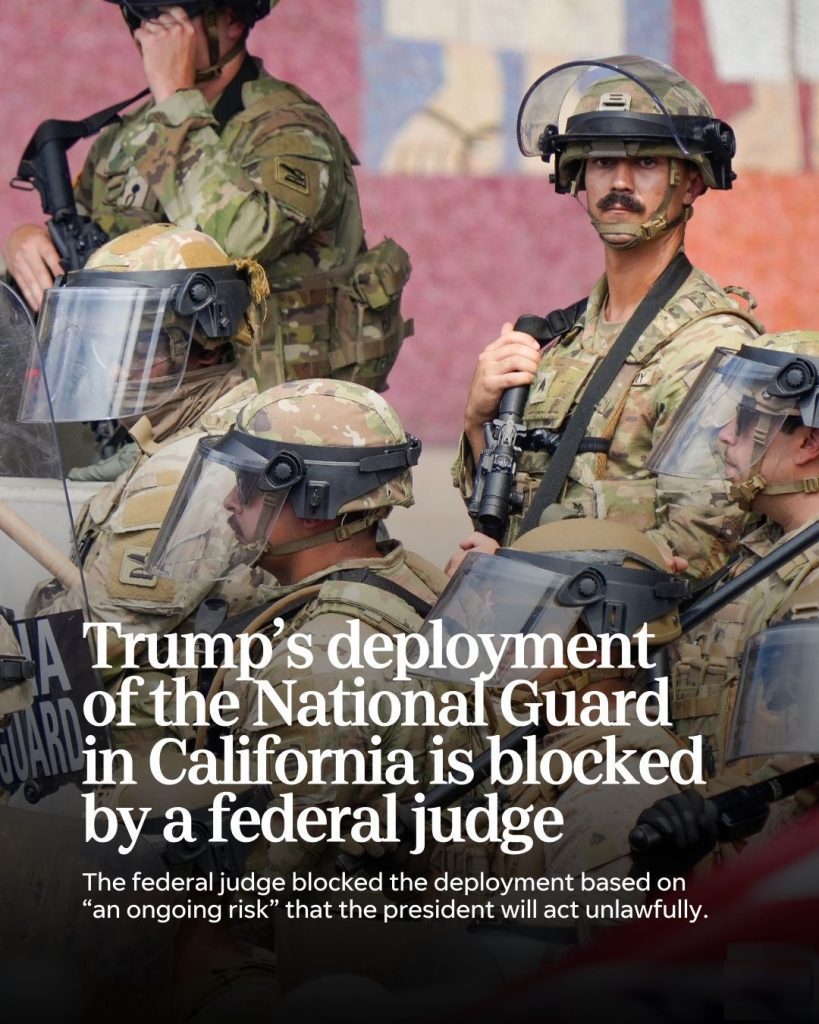A Landmark Ruling With National Implications
In a ruling that could reshape the balance between federal power and state sovereignty, U.S. District Judge Charles Breyer has blocked President Donald Trump’s deployment of National Guard troops in California. The decision, issued from San Francisco, concluded that Trump’s use of military forces in Los Angeles during protests against immigration enforcement violated the Posse Comitatus Act of 1878, a law that sharply restricts the role of the military in domestic policing.

Why the Court Stepped In
Judge Breyer’s opinion was direct: “Yet there was no rebellion, nor was civilian law enforceent unable to respond to the protests and enforce the law.” His ruling pointed out that Trump and Defense Secretary Pete Hegseth had planned to expand troop deployments into Oakland, San Francisco, and potentially other cities—despite the absence of the kind of emergency that would justify such actions.
The evidence showed that National Guard soldiers and Marines were used to set up protective perimeters, traffic blockades, and crowd control in Los Angeles. These activities, Breyer said, crossed the line into law enforcement duties that Congress specifically prohibited the military from performing on U.S. soil.
The Posse Comitatus Act: A Crucial Legal Barrier
At the heart of the ruling lies the Posse Comitatus Act, a post-Reconstruction law designed to prevent the military from becoming a domestic police force. Breyer underscored that Trump’s deployment blurred this line, effectively militarizing Los Angeles streets under the pretense of quelling rebellion—when no such rebellion existed.
Video : Federal Judge Blocks Trump’s National Guard Deployment In California | Violated Posse Comitatus Act
This ruling also challenges Trump’s broader approach to deploying troops in American cities. While the president retains unique authority in Washington, D.C., his attempts to extend this model to Los Angeles, Chicago, and other urban centers have ignited heated debates over legality and civil liberties.
California Leaders Push Back
California Gov. Gavin Newsom praised the ruling, declaring on social media: “The ruling is clear: Trump is breaking the law by trying to create a national police force with himself as its chief.”
Los Angeles Mayor Karen Bass was equally blunt, accusing the administration of attempting to “invade the second-largest city in the country.” In her words: “That was illegal. Los Angeles will not buckle and we will not break.”
Both leaders have maintained that the protests—though at times tense—did not justify the presence of federal troops. For them, Breyer’s ruling affirms the state’s authority to manage its own security without unwanted military interference.

Trump’s Response: Defiance and Spin
Unsurprisingly, Trump fired back. Labeling Breyer a “radical left judge,” he downplayed the order by emphasizing that 300 National Guard members would remain in Los Angeles. “That’s all we need,” he told reporters, suggesting that the limited presence still served his administration’s objectives.
Acting U.S. Attorney Bill Essayli in Los Angeles also pushed back, calling the injunction “misleading.” He insisted the troops had never directly engaged in law enforcement and argued that their role was limited to protecting federal agents during sensitive operations, such as raids on marijuana farms.
Inside the Courtroom: The Battle Over Evidence
The three-day trial that concluded on August 13 focused on whether the military overstepped its role. State attorneys presented testimony that troops had conducted police-style functions, including establishing perimeters and detaining at least two individuals. They warned that failing to challenge Trump’s actions would open the door to a “vast and unprecedented shift in the role of the military in our society.”
Video : Judge says Trump administration violated law by deploying National Guard to L.A.
The Trump administration countered by framing the deployment as defensive. Lawyers insisted that troops only acted to shield federal immigration agents from threats and never directly carried out arrests or searches. The administration argued that protecting federal personnel fell squarely within its legal rights.
Why This Case Matters Beyond California
This battle extends far beyond Los Angeles. Trump has repeatedly threatened to send troops into cities like Chicago and Baltimore, framing them as crime-ridden “hell holes.” Critics argue this rhetoric is not only inflammatory but also unconstitutional when paired with actual military deployments.
Chicago’s mayor, Brandon Johnson, has already described Trump’s plans as “tyranny.” The California ruling bolsters that position by establishing a clear legal precedent: absent rebellion or a collapse of civilian law enforcement, presidents cannot insert the military into domestic policing.
A Clash of Visions: Security vs. Civil Liberties
At its core, this confrontation isn’t just about legality—it’s about competing visions for America. Trump and his supporters frame military deployments as decisive action against lawlessness, positioning federal troops as a fast solution to urban unrest. Opponents see these moves as authoritarian overreach, eroding the line between military and civilian life that has long safeguarded democracy.

The ruling reflects the larger national debate: how to balance public safety with civil liberties, especially in moments of political tension. It highlights the enduring importance of constitutional guardrails in times when leaders are tempted to bypass them.
Conclusion: A Warning for the Future
Judge Breyer’s ruling against Trump’s deployment of National Guard troops in California is more than a legal decision—it’s a reminder of the fragile boundaries between military power and civilian governance.
For California leaders, it’s a victory affirming state rights and the rule of law. For Trump, it’s a setback he downplays but one that complicates his broader vision of using federal troops as a tool of domestic enforcement.
As the nation watches, the message is clear: the streets of American cities are not battlegrounds for military occupation. The debate over how far federal power can reach into local affairs will continue, but Breyer’s decision draws a sharp line that future presidents—and the country—will not easily ignore.